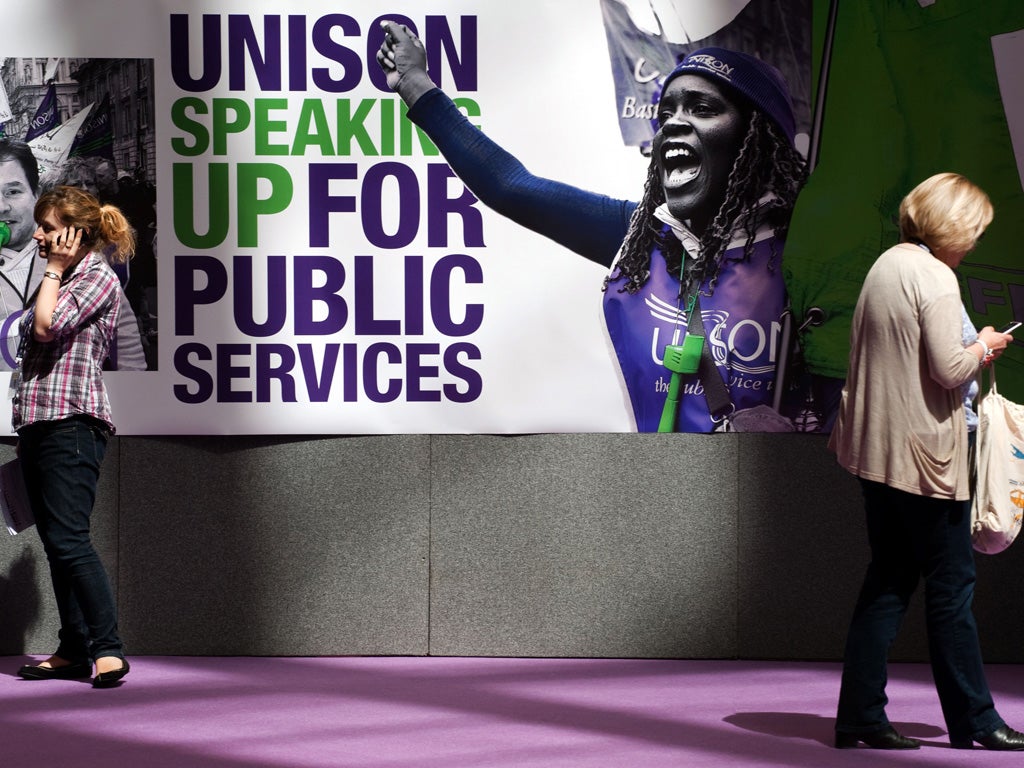Cameron 'delighted as union leaders walk into strike trap'
Ministers believe public sector workers will alienate voters with this month's walkout

Your support helps us to tell the story
From reproductive rights to climate change to Big Tech, The Independent is on the ground when the story is developing. Whether it's investigating the financials of Elon Musk's pro-Trump PAC or producing our latest documentary, 'The A Word', which shines a light on the American women fighting for reproductive rights, we know how important it is to parse out the facts from the messaging.
At such a critical moment in US history, we need reporters on the ground. Your donation allows us to keep sending journalists to speak to both sides of the story.
The Independent is trusted by Americans across the entire political spectrum. And unlike many other quality news outlets, we choose not to lock Americans out of our reporting and analysis with paywalls. We believe quality journalism should be available to everyone, paid for by those who can afford it.
Your support makes all the difference.Strikes by millions of public sector workers over reform of their pensions will bolster support for the Government's austerity drive, senior cabinet sources have claimed.
No 10 is said to be "delighted" at the prospect of walkouts on 30 November despite a more generous offer being made to union leaders last week. Liberal Democrat and Conservative ministers privately believe their argument will be strengthened by public anger at disruption by state workers who will still have more generous retirement funds than most in the private sector.
"Militancy could be good for the coalition in the longer term," said a very senior Lib Dem minister. "It will be troublesome immediately, but the public is not with the unions. In the current economic circumstances, it will be difficult for the unions to gain public support for their case. We are confident that we can win the argument, and strikes will only damage the unions."
A Conservative minister added: "It is clear No 10 is delighted that the unions have fallen into their trap."
Last week the Government unveiled a new offer as the "best we are going to get" in terms of money, which included future schemes being based on a pension to the value of 1/60th of average salary accruing for each year worked rather than 1/65th. No one less than 10 years off retirement will see changes to the date they can draw their pension or the amount they receive. If a deal can be struck, no further changes would be made for 25 years.
The unions immediately said the offer was not good enough to call off strikes that will hit public services including schools, courts, hospitals and councils. Ministers are gambling that the public will not side with strikers.
The talks have been led from the Government side by Francis Maude, the Tory Cabinet Office minister, and Danny Alexander, the Lib Dem Chief Secretary to the Treasury. "We want agreement and to be able to finalise details of the plans by the end of the year," said a source close to the talks. "The ball is now in the unions' court."
The Government insists that it is a "basic mathematical issue" that civil service pensions need reform. No 10 has vowed to do "whatever we can to ameliorate the consequences of the strike", and believes the walkouts could drive a wedge between the unions and the public.
"If you are a public sector worker you will still end up in a situation where you have a defined pension at the end of it that's clear and generous," a Downing Street insider said. "If you are in the private sector, the vast majority don't know what their pension is."
Unison, which represents one million people, from school dinner ladies and bin collectors to social workers and NHS staff, defended the results of its ballot in favour of striking after just 29 per cent of those eligible took part. Ballot papers have now been sent to 200,000 members of the NASUWT teaching union. They are expected to be joined by the Association of Teachers and Lecturers and the National Union of Teachers, and for the first time in the dispute the National Association of Head Teachers is balloting members.
The Department for Education, which assumes the 30 November strike will be "bigger" than the one in June, is sending a two-page information bulletin to every school in England in an attempt to persuade teachers not to strike. Similar information is being distributed by the Department of Health and the Treasury.
Last month, Mr Maude told The Independent on Sunday: "At a time when the economy is not growing as strongly as everyone hoped, I think for the trade unions to be casually engaging in strike action that inflicted economic damage would imperil any goodwill that exists towards the trade union movement."
Join our commenting forum
Join thought-provoking conversations, follow other Independent readers and see their replies
Comments